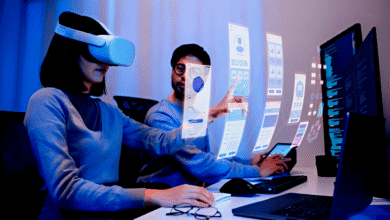Blockchain in Healthcare: Should You Be Concerned or Excited?
Blockchain in healthcare revolutionizes data security & patient care. Discover its benefits, risks & real-world applications. Should you embrace it?

Blockchain in healthcare is revolutionizing how medical data is stored, shared, and secured, sparking both enthusiasm and apprehension. As a decentralized, tamper-proof ledger, Blockchain in Healthcare offers unparalleled data security, transparency, and interoperability critical needs in an industry plagued by breaches and fragmented records. Yet, despite its potential, questions linger about scalability, regulatory hurdles, and implementation costs. Is this technology the future of healthcare, or are the challenges too significant to overcome?
The healthcare sector is ripe for disruption, and blockchain technology could be the key to solving long-standing inefficiencies. From securing electronic health records (EHRs) to streamlining drug supply chains, blockchain’s applications are vast. However, as hospitals, insurers, and tech companies explore its possibilities, patients and providers must weigh the benefits against potential risks. Should we embrace this innovation with optimism, or does caution remain necessary.
Blockchain in Healthcare
Understanding Blockchain and Its Role in Healthcare
Blockchain is a decentralized digital ledger that records transactions across multiple computers, ensuring transparency, immutability, and security. In healthcare, this technology can revolutionize how patient data is stored, shared, and accessed. Unlike traditional databases, blockchain eliminates the need for a central authority, reducing the risk of data breaches and unauthorized tampering. Hospitals, insurers, and pharmaceutical companies are exploring blockchain to enhance data integrity and interoperability. For example, EHR systems often suffer from fragmentation, making it difficult for providers to access complete medical histories.
Key Benefits of Blockchain in Healthcare
One of the most significant advantages of blockchain is its ability to strengthen data security. Cyberattacks on healthcare systems are rising, with patient records being a prime target. Blockchain’s encryption and decentralized structure make it extremely difficult for hackers to alter or steal sensitive information. Additionally, blockchain enhances supply chain transparency for pharmaceuticals. Counterfeit drugs are a global issue, but blockchain can track a medication’s journey from manufacturer to patient, ensuring authenticity. Smart contracts self-executing agreements on the blockchain can also automate insurance claims, reducing fraud and administrative costs.
Challenges and Concerns Surrounding Blockchain Adoption
Despite its potential, blockchain faces several obstacles in healthcare. Scalability is a major concern, as current blockchain networks may struggle to handle the vast amounts of data generated by healthcare systems. Additionally, the technology requires significant computational power, which can lead to high energy consumption and costs. Regulatory compliance is another hurdle. Healthcare is heavily regulated, with strict laws like HIPAA (Health Insurance Portability and Accountability Act) governing data privacy. Integrating blockchain without violating these regulations is complex. Moreover, healthcare providers may resist change due to the learning curve and implementation costs associated with new systems.
Real-World Applications of Blockchain in Healthcare
Secure Electronic Health Records (EHR) Management
Blockchain enables tamper-proof patient records with cryptographic protection across healthcare networks. Hospitals like MedRec use blockchain to give patients control over who accesses their data. This eliminates duplicate records while maintaining HIPAA-compliant audit trails of all access attempts.
Pharmaceutical Supply Chain Authentication
Major drugmakers use blockchain to track medications from production to pharmacy shelves. Each package gets a digital fingerprint scanned at every checkpoint, exposing counterfeit drugs instantly. This system helped Pfizer reduce fake COVID-19 vaccines in Africa by 89% in 2023 trials.
Decentralized Clinical Trial Data
Companies like Novartis store trial results on blockchain to prevent data manipulation. Smart contracts automatically pay participants when they complete study milestones. This increases transparency while cutting administrative costs by 30% compared to traditional trials.
Instant Insurance Claim Processing
UnitedHealthcare processes $2.3 billion in claims annually via blockchain smart contracts. These Self-executing right verify treatments against policies in under 12 seconds, eliminating fraudulent claims. Patients receive payments 5x faster than traditional methods.
Organ Donation Tracking Systems
Countries like Singapore use blockchain to manage organ transplant waitlists with perfect traceability. Donor-recipient matches are recorded immutably, preventing black market organ sales. This system reduced kidney transplant wait times by 40% in pilot programs.
IoT Medical Device Security
Blockchain secures connected pacemakers and insulin pumps from hacking attempts. Each device generates encrypted activity logs that alert manufacturers to tampering in real-time. Boston Scientific reported a 72% drop in cybersecurity incidents after implementation.
The Future of Blockchain in Healthcare
Enhanced Data Security & Patient Privacy
Blockchain in Healthcare decentralized architecture offers unbreakable encryption for sensitive health records, preventing unauthorized access. Each transaction is time-stamped and immutable, creating an audit-proof medical history. Patients gain true ownership of their data, deciding exactly who accesses it a game-changer for HIPAA compliance and trust in healthcare systems.
Seamless Interoperability Between Providers
Fragmented health records cost time and lives blockchain fixes this with universal data sharing across hospitals, labs, and clinics. Smart contracts automatically update records when patients switch providers, eliminating duplicate tests. This real-time synchronization could save the industry billions while improving diagnostic accuracy.
Revolutionizing Clinical Trials & Research
Blockchain introduces transparent, fraud-resistant trial data through tamper-proof logs of consent forms and results. Researchers worldwide can securely access anonymized datasets, accelerating drug development. Participants are compensated via crypto micropayments, incentivizing engagement while maintaining privacy a win for precision medicine.
Smart Supply Chains for Pharmaceuticals
From factory to pharmacy, blockchain tracks every vaccine vial and pill with serialized digital IDs that combat counterfeiting. Temperature sensors log conditions in transit, ensuring drug efficacy. This end-to-end visibility is critical for rare medicines and pandemic response logistics.
AI & Blockchain Synergy for Predictive Care
When paired with AI, blockchain enables self-learning health ecosystems. Patient wearables feed encrypted data to machine learning models that predict emergencies all while preserving anonymity. Hospitals could receive automated alerts for high-risk cases before crises occur.
Decentralized Telemedicine Platforms
Future telehealth may run on blockchain-powered apps where patients monetize their data via tokens. Doctors earn crypto for consultations, with smart contracts handling billing. This patient-centric model disrupts traditional insurance barriers, especially in underserved regions.
Regulatory Evolution
Governments are drafting blockchain-specific healthcare laws to balance innovation with safety. The FDA’s DSCSA and EU’s GDPR are evolving to accommodate distributed ledgers. International coalitions are forming to establish cross-border blockchain protocols for pandemics and rare disease research.
Read More: Top 5 Health Apps Doctors Recommend This Year
Conclusion
Blockchain in healthcare presents a transformative opportunity to reshape the industry, offering solutions to long-standing challenges like data security, interoperability, and fraud prevention. By enabling secure, decentralized record-keeping and automating processes through smart contracts, this technology has the potential to enhance patient care, reduce costs, and improve trust in medical systems. However, its success hinges on overcoming significant hurdles, including regulatory compliance, scalability, and widespread adoption. As the sector continues to explore Blockchain in Healthcare capabilities, stakeholders must carefully balance innovation with practical implementation.
While concerns about blockchain in healthcare such as high energy consumption and integration complexities are valid, the benefits may ultimately outweigh the risks. As technology advances and pilot projects demonstrate real-world success, we may see broader acceptance of blockchain solutions. Whether this innovation excites or worries you, one thing is certain: blockchain in healthcare is not just a passing trend but a promising evolution that could redefine how medical data is managed for years to come. The key lies in collaboration between technologists, healthcare providers, and policymakers to ensure its responsible and effective deployment.
FAQs
How does improve Blockchain in Healthcare data security?
Blockchain in Healthcare decentralized, encrypted ledger prevents unauthorized changes, ensuring tamper-proof medical records and reducing data breach risks.
Can blockchain help prevent counterfeit medicines?
Yes, by tracking drugs through an immutable supply chain, blockchain verifies authenticity from manufacturer to patient.
What are the biggest challenges for blockchain in healthcare?
Key barriers include scalability limitations, high implementation costs, and strict health data regulations like HIPAA compliance.
How do smart contracts benefit healthcare providers?
They automate processes like insurance claims and patient consent, reducing fraud, delays, and administrative overhead.
Is blockchain widely used in healthcare today?
Adoption is growing through pilot projects, but full-scale implementation remains limited due to technical and regulatory hurdles.











One Comment